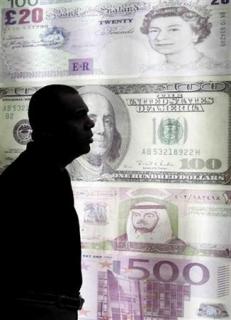Latest NEWS
- Aswat Masriya, the last word
- Roundup of Egypt's press headlines on March 15, 2017
- Roundup of Egypt's press headlines on March 14, 2017
- Former Egyptian President Hosni Mubarak to be released: lawyer
- Roundup of Egypt's press headlines on March 13, 2017
- Egypt's capital set to grow by half a million in 2017
- Egypt's wheat reserves to double with start of harvest -supply min
- Roundup of Egypt's press headlines on March 12, 2017
Egyptian 'government financing needs remain relatively large' - Moody's analyst

A man walks past a currency exchange office in Cairo - Reuters/Mohamed AbdelGhany
By Hend Kortam
CAIRO, Nov. 3 (Aswat Masriya) - Credit ratings agency Moody's in a report Tuesday listed several challenges facing the Egyptian government including "large financing needs, structural economic issues ... and elevated political risks."
These challenges have persisted despite reforms in the public finances and economic conditions, Moody's said.
Steffen Dyck, a vice president and senior analyst at the ratings agency said that "the economic and fiscal reform momentum in Egypt will help fiscal deficits and government debt levels to gradually reduce, although government financing needs remain relatively large."
Moody's warning about the challenges ahead comes in spite of the agency's positive outlook on growth in Egypt in the current fiscal year, which ends next June. The agency forecasts real Gross Domestic Product (GDP) to grow by five percent this fiscal year, the same rate that the Egyptian government is eying.
"Egypt's economic growth over the next 12-18 months will likely be supported by both public and private investment," Moody's said. Throughout the past year, the administration of President Abdel Fattah al-Sisi has been trying to attract much needed foreign cash inflows, hosting a major economic summit in March and ammending legislation to ease conditions for investors.
Moody's GDP growth forecast, however, is higher than the forecasts of the International Monetary Fund (IMF) and the World Bank (WB), two of the world's largest global financial institutions. The IMF expects growth rates of 4.2 and 4.3 in 2015 and 2016, respectively. Similarly, the WB says growth will "hover around 4 percent" in 2015 and 2016.
Egypt's economic growth in all quarters of the previous fiscal year has yet to be released but is projected to be 4.2 percent.
But even though Moody's has a more optimistic forecast, the agency says that global factors outside of the Egyptian economy are likely to have an effect on it. A growth in imports of capital goods because of an expected increase in investment, "coupled with weak global demand, will weigh on net exports' contribution to growth" in Egypt.
The agency does predict "credit-positive contributions" in the medium-term from the recent expansion of the Suez Canal, a mega-project which cost the Egyptian state billions of Egyptian pounds and raised questions on when the cash-strapped country would reap the benefits of such a large investment.
Egypt's economy has been hit hard by the political turmoil gripping the country since a popular uprising toppled former President Hosni Mubarak in January 2011.
Foreign exchange reserves have fallen by more than half since 2011 when they were valued at $36 billion before the uprising.
Amid the continued pressure on foreign reserves, Egypt has had to depreciate its currency multiple times this year, with forecasts on the inevitability of further devaluations.










